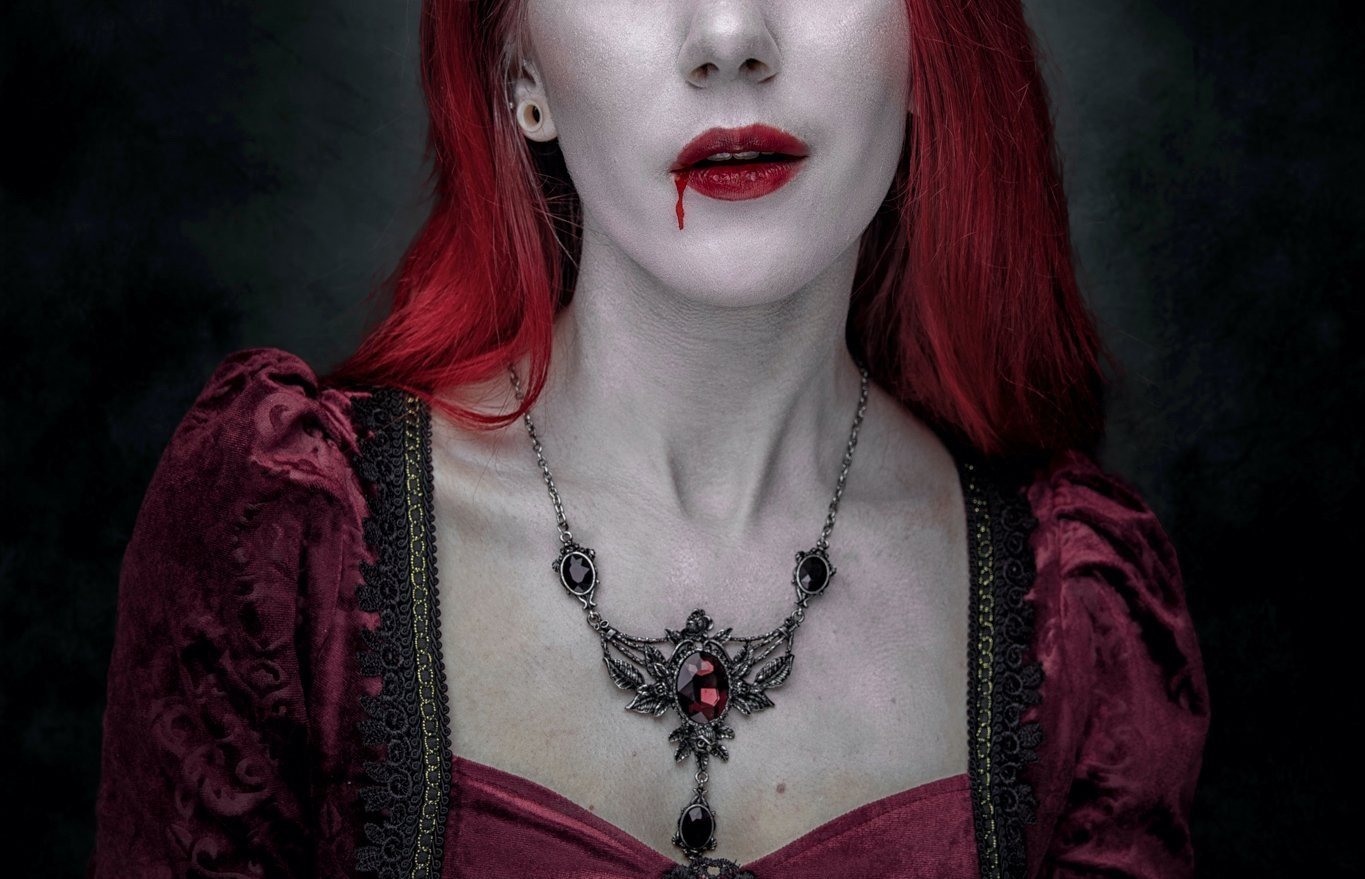[Editorial] Carmilla Isn't Just a Lesbian Vampire – She's Also a Really Bad Girlfriend
***SPOILERS AHEAD***
Whether she's known by Carmilla, Mircalla or Millarca, the bewitching queer vampire at the heart of Irish author Joseph Sheridan Le Fanu's 1872 novella Carmilla is one of the most iconic characters in vampire literature. (She even predated Bram Stoker's "Dracula, which was published two decades later.) She's inspired everything from comic books to operas to TV series.
In the original source material, her name changes as she moves from woman to woman, but her seduction methods throughout the story remain very similar. While it's refreshing to see a historical novel with such obvious lesbian romance, it's a bit alarming that none of the young ladies Carmilla set her sights on pay attention to the red flags. Perhaps they could've avoided a messy (and ultimately murderous) relationship.
Carmilla is told through the eyes of Laura, a young lady who has met and become enchanted by the titular vampire. Laura is a little lonely; she lives in a huge castle with her father and some hired help, with not many folks her age around. While out on a stroll, the group witnesses a dreadful accident involving a horse-drawn carriage containing a mother and daughter. Strangely, the mother immediately decides that her daughter Carmilla must stay with Laura and her father to recuperate, while the mother continues her journey alone.
Laura begs her father to let Carmilla stay, and her father is so kind-hearted that he most likely would've agreed anyway. When Laura gets her first good look at her new pal, she recognizes her from a dream she had as a child a dozen years prior. The dream involved a young woman who looked just like Carmilla creeping onto her bed and then feeling two sharp needles pierce her skin. Carmilla claims she also recognizes Laura from a dream, but she mentions nothing about skin-piercing needles. She tells Laura:
"If you were less pretty I think I would be very much afraid of you, but being as you are, and you and I both so young, I feel only that I have made your acquaintance twelve years ago and have already a right to your intimacy… I wonder whether you feel as strangely drawn towards me as I do to you."
This should've been Laura's first clue that something wasn't quite right. Carmilla forces a bond with Laura that hasn't been earned. True, Laura did encounter a Carmilla-like apparition as a child, but that apparition ended up piercing her breast, à la vampire. This shouldn't be a reason to feel closer to Carmilla; in fact, it should be a warning sign. Laura is conflicted; she says, "I did feel, as she said, 'draw towards her,' but there was also something of repulsion."
Laura's attraction wins out. She rhapsodies, "[Carmilla] was so beautiful and so indescribably engaging." Laura and many of the other characters who encounter Carmilla spent a lot of time waxing poetic about her beauty, to the point that one can't help but wonder how poor Laura felt. Laura herself even notes at one point that she suspects her father is comparing the appearances of the two young women.
Carmilla and her long-gone mother are both very mysterious about their identities, so naturally Laura tries to learn more about the woman she is spending so much time with. Carmilla baulks and doesn't give Laura many answers. Instead she tells her, "[I]f your dear heart is wounded, my wild heart bleeds with yours. In the rapture of my enormous humiliation I live in your warm life, and you shall die – die, sweetly die – into mine… trust me with all your loving spirit." Red flag, Laura! Red flag! While those are very pretty words, the meeting is terrifying. These two women just met, and already Carmilla is knowingly wounding Laura's heart by refusing to answer her questions, then asking Laura to trust her? Highly suspicious behaviour in a blossoming romance.
Carmilla uses her feminine wiles to ensure Laura listens to her. After making these dramatic statements, says Laura, Carmilla would "press me more closely in her trembling embrace and lay soft kisses upon my cheek." Laura is blinded by her attraction to the beautiful Carmilla and can't resist being close to her and feeling these "soft kisses."
GHOULS PODCAST
And Carmilla doesn't stop there. As Laura describes it: "Her hot lips travelled along my cheek in kisses; and she would whisper, almost in sobs, 'You are mine, you shall be mine, you and I are one forever.'" Laura, a bit naïve, responds, "Are we related?" as she tries to comprehend the intense love that Carmilla has foisted upon her. Despite the passionate kisses, embraces and fervent declarations, Laura seems uncertain about her mysterious houseguest. Still, Carmilla continues to lovebomb her, to use a modern phrase.
Third red flag: Carmilla becomes extremely vexed and physically uncomfortable when a funeral passes by the two young women, and she hears funeral hymns. She forbids Laura from singing along with the procession and seems almost unable to bear this religious ceremony. Not only is her stopping Laura from singing overbearing, but her disgust with the service seems over the top. She tells Laura, "Everyone must die – and all are happier when they do."
Later on, as Laura and Carmilla stroll in the moonlight, Carmilla tells Laura, "I live in you; and you would die for me, I love you so." Carmilla's preoccupation is troubling, and insisting that Laura would die for her is so extreme – it's hard to imagine what Laura was thinking, but she doesn't return Carmilla's obsessively amorous words, despite her attraction to her.
Before long, Laura starts getting nightly visits from a creature who climbs onto her bed, which is followed by "a stinging pain as if two large needles darted, an inch or two apart, into [her] breast." As a youth, Laura dreamt of Carmilla and felt the same dual sharp sensations. Now with Carmilla in her home, expressing more and more alarming feelings about her feelings for Laura every day, she feels the stinging pain again. Red flag!
Sadly, as with many bad relationships, Laura starts to feel depressed – or as she puts it, "A strange melancholy was stealing over me, a melancholy I would not have interrupted. Dim thoughts of death began to open." Coincidentally, she notices, "Carmilla became more devoted to me than ever, and her strange paroxysms of languid adoration more frequent." Carmilla is quite literally sucking the life out of her loyal companion. It is clear Laura still cares for Carmilla and seems clueless to her darker side, but she's suffering as a result of their romance.
In one of Carmilla's most explicit passages, Laura describes the strange feelings that descend upon her at night.
"Sometimes there came a sensation as if a hand was drawn softly along my cheek and neck. Sometimes it was as if warm lips kissed me, longer and longer and more lovingly as they reached my throat, and there the caress fixed itself. My heart beat faster, my breathing rose and fell rapidly; then came a sobbing that rose into a sense of strangulation and turned into a dreadful convulsion, in which my sense left me and I became unconscious."
As award-winning queer author and academic Carmen Maria Machado says in her footnotes to the 2019 edition of Carmilla, "If this isn't an orgasm, nothing is." Troublingly, these feelings aren't coming to her during her waking hours; they're coming to her at night. Is Carmilla inside her dreams? Or is she physically present while Laura falls in and out of sleep?
Luckily for Laura, she is saved before she totally succumbs to Carmilla's devastating charm and obsessive love. Upon meeting with her father's friend General Spielsdorf, Laura and her father realise that the general's daughter was seduced in an eerily similar manner by a beautiful young woman named Millarca (an anagram for Camilla). General Spielsdorf then reveals that he's in search of the grave of Countess Mircalla (another anagram for Camilla) who was thought to be deceased. Lo and behold, when the grave is opened, it is Carmilla residing there, sleeping in a pool of blood. Her heart is pierced with a stake, and she is beheaded to ensure that the vampiric seductions in their country will stop.
Years after her turbulent time with Carmilla, Laura is still unsettled by her experience. She says, "[T]he image of Carmilla returns to my memory with ambiguous alternations." She looks back at the intense relationship the two young women shared, and she can still see Carmilla as both "the playful, languid, beautiful girl" and "the writhing fiend." In the end, Carmilla was an emotional vampire as well as a traditional one, draining Laura bit by bit. Laura escapes from Carmilla's grasp, but like everyone with at least one or two bad exes in their past, she is still haunted by the memory of their fraught romance.


![[Editorial] In Her Eyes: Sara Lowes in Witchfinder General (1968)](https://images.squarespace-cdn.com/content/v1/5fe76a518d20536a3fbd7246/1655655953171-8K41IZ1LXSR2YMKD7DW6/hilary-heath.jpeg)
![[Editorial] The Babadook (2014)](https://images.squarespace-cdn.com/content/v1/5fe76a518d20536a3fbd7246/1651937631847-KR77SQHST1EJO2729G7A/Image+1.jpg)
![[Editorial] In Her Eyes: Helen Lyle in Candyman (1992)](https://images.squarespace-cdn.com/content/v1/5fe76a518d20536a3fbd7246/1649586854587-DSTKM28SSHB821NEY7AT/image1.jpg)
![[Editorial] Lorraine Warren’s Clairvoyant Gift](https://images.squarespace-cdn.com/content/v1/5fe76a518d20536a3fbd7246/1648576580495-0O40265VK7RN03R515UO/Image+1+%281%29.jpg)
![[Editorial] Sara in Creep 2 (2017)](https://images.squarespace-cdn.com/content/v1/5fe76a518d20536a3fbd7246/1646478850646-1LMY555QYGCM1GEXPZYM/27ebc013-d50a-4b5c-ad9c-8f8a9d07dc93.jpg)
![[Editorial] Sally Hardesty in The Texas Chainsaw Massacre (1974)](https://images.squarespace-cdn.com/content/v1/5fe76a518d20536a3fbd7246/1637247162929-519YCRBQL6LWXXAS8293/the-texas-chainsaw-final-girl-1626988801.jpeg)
![[Editorial] Margaret Robinson: Hammer’s Puppeteer](https://images.squarespace-cdn.com/content/v1/5fe76a518d20536a3fbd7246/1630075489815-33JJN9LSGGKSQ68IGJ9H/MV5BMjAxMDcwNDI2Nl5BMl5BanBnXkFtZTcwOTMxODgzMQ%40%40._V1_.jpg)
![[Editorial] Re-assessing The Exorcist: Religion, Abuse, and The Rise of the Feminist Mother.](https://images.squarespace-cdn.com/content/v1/5fe76a518d20536a3fbd7246/1629995626135-T5K61DZVA1WN50K8ULID/image2.jpg)
![[Editorial] Unravelling Mitzi Peirone’s Braid (2018)](https://images.squarespace-cdn.com/content/v1/5fe76a518d20536a3fbd7246/1628359114427-5V6LFNRNV6SD81PUDQJZ/4.jpg)















![[Editorial] Oscar Nominations 2026: Where to stream all the horror picks](https://images.squarespace-cdn.com/content/v1/5fe76a518d20536a3fbd7246/1769113319180-4INRRNMZK4DZLHRSUXX5/rev-1-GRC-TT-0026r_High_Res_JPEG-1024x372.jpeg)
![[Editorial] 10 Films & Events to Catch at Soho Horror Film Fest 2023](https://images.squarespace-cdn.com/content/v1/5fe76a518d20536a3fbd7246/1700819417135-299R7L4P0B676AD3RO1X/Screenshot+2023-11-24+at+09.41.52.png)
![[Editorial] 9 Horror Nintendo Switch Games To Play](https://images.squarespace-cdn.com/content/v1/5fe76a518d20536a3fbd7246/1697214470057-3XZXX8N4LYIMDFWS6Z3P/Screenshot+2023-10-13+at+17.20.13.png)
![[Mother of Fears] Mothering in Silence in A Quiet Place (2018)](https://images.squarespace-cdn.com/content/v1/5fe76a518d20536a3fbd7246/1696445921315-HZJ2DZYQIH6VVWXBO2YL/Screenshot+2023-10-04+at+19.52.29.png)
![[Editorial] 5 Female Focused Horror Book Recommendations](https://images.squarespace-cdn.com/content/v1/5fe76a518d20536a3fbd7246/1696441981361-52EQCTJ7AT2QF1927GM7/919xtm6d3fL._AC_UF894%2C1000_QL80_.jpg)
![[Editorial] 9 Best Slashers Released Within 10 Years of Scream (1996)](https://images.squarespace-cdn.com/content/v1/5fe76a518d20536a3fbd7246/1695478839037-LOFHGVM3H6BMSZW7G83M/Screenshot+2023-09-23+at+15.15.11.png)
![[Mother of Fears] Mother Vs. Monster in Silent Hill (2006)](https://images.squarespace-cdn.com/content/v1/5fe76a518d20536a3fbd7246/1695485781119-H6GNP0G3J2TLPAOIABV7/Screenshot+2023-09-23+at+17.11.56.png)
![[Editorial] 9 Terrifying Cerebral Visions in Horror Movies](https://images.squarespace-cdn.com/content/v1/5fe76a518d20536a3fbd7246/1693509801235-X23OL50T1DVGECH0ZJK2/MV5BMjQ0MTg2MjQ4MV5BMl5BanBnXkFtZTgwMTU3NDgxMTI%40._V1_.jpg)
![[Mother of Fears] I Don’t Wanna Be Buried in a Pet Sematary (1989) and (2019)](https://images.squarespace-cdn.com/content/v1/5fe76a518d20536a3fbd7246/1691328766069-QFNAVJOMFZVZ5CLU1RWM/Screenshot+2023-08-06+at+14.23.13.png)
![[Mother of Fears] How I Love to Love Nadine in The Stand (2020)](https://images.squarespace-cdn.com/content/v1/5fe76a518d20536a3fbd7246/1690213172707-TKM9MZXK02EVCIX30M1V/Screenshot+2023-07-24+at+16.29.11.png)

Possessor is a slick futuristic thriller in which Tasya Vos, an assassin for hire, must manage her responsibilities as an elite killing machine and complex feelings towards her husband and son, whilst taking on another high-profile job that will push her to the edge of her sanity.